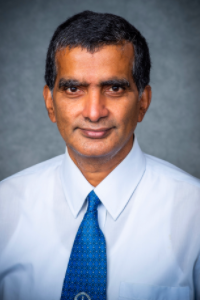 Sooryanarayana Varambally, Ph.D., Professor, Molecular & Cellular Pathology, was presented with the Outstanding Achievement Award by the Society of American Asian Scientists in Cancer Research (SAASCR) at this year's American Association for Cancer Research (AACR) annual meeting, held virtually in May 17-21.
Sooryanarayana Varambally, Ph.D., Professor, Molecular & Cellular Pathology, was presented with the Outstanding Achievement Award by the Society of American Asian Scientists in Cancer Research (SAASCR) at this year's American Association for Cancer Research (AACR) annual meeting, held virtually in May 17-21.
Varambally is Director of Integrative Translational Oncologic Pathology research and Co-director of the Graduate Biomedical Sciences program in Cancer Biology, and a scientist with the O'Neal Comprehensive Cancer Center, the Informatics Institute, and the Center for Clinical and Translational Science. The award recognizes, "his seminal contributions to the field of cancer research."
The Society of American Asian Scientists in Cancer Research is a nonprofit organization of more than 5,000 scientists from Asia who are working in the U.S. and Canada in the field of cancer research.
Varambally's research focus is on understanding the molecular basis of cancer using integrative genomic, epigenetic and proteomic approach. Our groups translational cancer research involves transferring the basic research discoveries to develop disease detection markers of developing therapy for the identified targets. He has worked extensively in the area of solid tumor genomics, biomarker discovery, biology, and therapeutic targeting.

His group’s research helps better understand the molecular alterations during the initiation and progression of multiple human malignancies. They perform integrative analyses to identify the best targets and work towards developing agents/drugs for specific causative targets. Varambally hopes to to develop multiple collaborations in order to hasten the pace of cancer research and discovery by team science approach. In order to enhance the speed of the cancer research/target discovery, he and his team built a discovery platform called UALCAN for cancer genomic and proteomic data analysis, making cancer research a worldwide team effort. This portal has been visited over 600,000 times and cited over 1,000 times from researchers across the globe since its release in 2017.